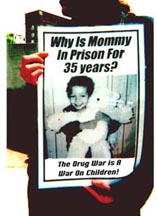|
by Kaponda
I felt like I had been atop Mount Everest, as I listened
to the small child in front of the United Nations Plaza.
Even the raised concrete structure on which the
beautiful, three-year old girl stood did not make her
appear any taller. The sound of her voice resonated
out of a loudspeaker as the breeze caused the unfurled
banners to cradle her body. True to the proverb, "Out
of the mouth of babes and suckling," it was she who
had provided me the insight into the significance of
the event held on Friday, May 12th, when she
uttered, "Happy Mothers Day to all of the Mothers in
Prison."
"Mothers in Prison -- Children in Crisis" was
sponsored by Families with a Future, an organization
founded by the mother of the three-year old wonder,
Ida McCray. Now in its sixth year, Mothers in
Prison, Children in Crisis is the first and only
national organizing campaign that seeks to establish
alternatives to incarceration as the sentencing norm
for women with dependent children. Based in the
state of New York, it has a broad-based community
of supporters around the country whose mission is to
use compelling statistics to demand legislators to
overhaul current sentencing regulations.
According to statistics gathered by Campaign 2000
JusticeWorks Community, there are now 146,600
women incarcerated in United States prisons and
jails. An astounding statistic by the U.S. Department
of Justice: Bureau of Justice Statistic, states that of
the 146,000 women incarcerated, 75% are mothers.
Furthermore, two-thirds of these women have
children under the age of 18.
A formerly incarcerated woman, Ida McCray had
spent 12 grueling years in the California Prison
System, California Youth Authority and Federal
prisons. I asked her what she would most like to
express to the people concerning the rally at Civic
Center Plaza. "We need more places that will help
families. Monies have been appropriated to fragment
families. We need money to build families,"
according to McCray. Standing firmly on her
commitment to end the separation of biological
families, McCray continued to express her feelings,
as the wind gingered up her healthy dreadlocks, "This
is a form of genocide which is being given no
attention. A glaring example is our children." Unlike
many incarcerated mothers, Ida McCray did not lose
her children during her time in prison.
Children are the first casualties when their mothers
are incarcerated. According to a statistic by the U.S.
Department of Justice: Office of Justice Programs,
"Women currently in prison or jail are mothers to
more than 250,000 children, the majority of whom
are under 18 years of age." "While children usually
remain with their mother during the incarceration of
their father," according to a study by The Obsborne
Association, "Children of incarcerated mothers are
much more likely to experience a change in primary
caretaker."
The strategic efforts of the supporters of the Mothers in
Prison, Children in Crisis movement have opened the
doors of people in high places. Acting under authority of
the State of Iowa, Governor Thomas J. Vilsack proclaimed
May 7, 1999 as Mothers in Prison -- Children In Crisis
Day." Also, acting under authority, Governor Mike
Huckabee of Arkansas, during a rally in May of 1999,
proclaimed May 9th through May 11th of 1999, "Mothers
in Prison, Children in Crisis Weekend."
One of the speakers at the rally was San Francisco District
Attorney, Terrence Hallinan, who gave the onlookers hope
when he stated that he would like to, "Declare an end to the
war on drugs. A war on drugs is not the solution, as it
causes more problems and much more misery." Hallinan
further stated that "Women are being incarcerated for
victimless crimes...."
An official for the Department of Health, Jimmy Loyce,
gave a passionate speech before the crowd at the Civic
Center Plaza. "Every day a mother does in prison, her
child does in prison [also]," Loyce stated. He added that
"The only crime is a disease called alcoholism and drug
addiction," implying that a connection exists between
women who are incarcerated and their addiction to drugs
and alcohol.
A recent study by the U.S. Department of Justice: Office of
Justice Programs has determined that, "Women in prison
are more likely than men to have ever used drugs, to have
used drugs daily the month before their offense, to have
been under the influence of drugs while committing the
offense and to have committed the offense to get drugs."
"Less than 10% of those who need substance abuse
treatment in prison actually receive it. Seventy-five percent
of the general population who seek substance abuse
treatment, never receive it," according to The Nation1s
Number One Health Problem.
Claire Campbell of Jelani House, Inc., a refuge for
pregnant women, underscored the misappropriations of
funds to criminalize offenders of victimless crimes by
stating, "Women are in jail for nonviolent crimes, like
holding drugs for others." She called for women to stay
tuned in to each other.
The Executive Director for Standing Against Global
Exploitation (SAGE) provided recommendations to
changing the system. She stated that "Since changing
institutions is very difficult, we must change the minds of
individuals inside the system, and expose them to
alternatives to incarceration."
According to the Mothers in Prisons, Children in Crisis1
Fact Sheet, "Alternatives to incarceration have been
legislatively endorsed for more than 20 years. The
understanding which guided the early movement towards
alternatives was that penal institutions are destructive to the
humanity of prisoners, guards, administrators and the
community. Thus, alternatives were designed to keep
people out of jail and prison.
The recommended alternatives to incarceration of women
would probably decrease rapidly increasing separation of
biological families. There would be more children in the
warm embrace of their loving parents. It is a concept that
would give Mothers Day a whole new meaning. |





